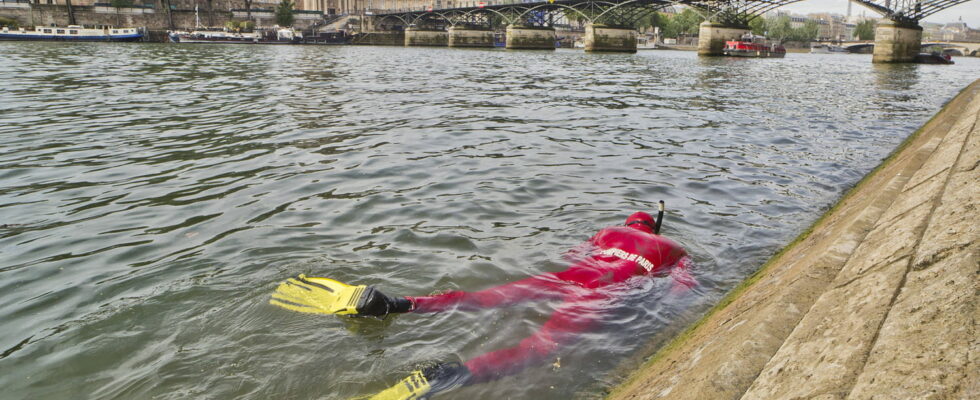Some dangerous substances are not measured in the Seine.
The Seine, a water previously considered unsuitable for swimming according to current European and national regulations, is to host swimming, triathlon and paratriathlon events during the 2024 Olympic and Paralympic Games. But a few weeks before the opening ceremony on July 26, swimming in the river remains uncertain… because it is still too polluted.
Many studies have highlighted health risks for swimmers who are required to bathe in the Seine. While the chemical risk appears to be negligible, the microbiological risk appears more worrying. The question of the risks to which athletes will be exposed was the subject of an article published in the journal Archives of occupational and environmental diseasesThis work was carried out by a group of interns in infectious diseases, microbiologists and health specialists, as part of a public health course provided by the Pasteur-Cnam School.
The most monitored fecal contamination bacteria
The regulations in force relating to the management of bathing water quality are those of the European directive of 2006. “In other words, there is an obligation to monitor the concentrations of two bacteria that indicate fecal contamination: Escherichia coli and intestinal enterococci.” explains Anne Le Flèche-Matéos, head of the Bacterial Identification Unit of the Emergency Biological Intervention Unit (CIBU) of the Pasteur Institute. Based on data from the literature, an identification of pathogens and dangerous substances potentially present in the Seine was carried out, and different exposure scenarios for athletes were determined. When recent data from measurements in the Seine were available, a risk assessment was proposed.
“Certain dangerous substances are not measured in the Seine”
Concerning the microbiological risk, today, the indicators of faecal contamination recommended for bathing water do not respect the thresholds in force for sufficient quality. “Concerning the chemical risk – that is to say the concentration of products arriving in the water following industrial, agricultural or urban discharges – the available measurements carried out in the Seine systematically find concentrations well below the risk thresholds identified in the literature.” However, certain substances identified as dangerous are not, to date, measured in the Seine and their risk cannot be assessed.
Microbiological agents in the crosshairs
“The risk is to be sought on the side of microbiological agents, that is to say at the level of bacteria, viruses and parasites which can circulate in the water of the Seine, explains Anne Le Flèche-Matéos. These microorganisms are likely to increase the risk of contracting gastroenteritis through ingestion of water and skin infections through contact with water.” However, the rates recorded during the summer of 2023 largely exceeded the thresholds of sports federations as well as those of health authorities, as revealed franceinfo in January 2024. In view of these results, the authors estimate that the microbiological risk is “worrying”. “The heavy rains we had in June, the little sunshine and the relatively low temperatures for the season are all elements which have encouraged the discharge of waste water into the Seine”, continues the specialist.
Leptospirosis linked to rat urine
Other risks are also mentioned. “This is particularly the case for leptospirosis, a bacterial disease caused by Leptospira interrogans, present in the urine of rats. Many clinical forms, ranging from flu syndrome to multi-organ involvement with hemorrhagic syndrome, have been described,” recalls Anne Le Flèche-Matéos. “No systematic monitoring is carried out”, the study points out. “However, in 2022, for metropolitan France, Ile-de-France was one of the regions with the highest incidence rate of leptospirosis with a pronounced summer resurgence.”
Finally, there are also possible risks of skin infections. “Contact with contaminated water can lead to skin infections or dermatitis. It is recommended to shower thoroughly after swimming, and to apply bandages if the skin is damaged or injured.” In fact, bacteria enter the body through wounds or mucous membranes. “Antibiotic treatments will be indicated in the event of bacterial infections,” our interlocutor specifies. “For diseases linked to viruses present in fecal matter (adenovirus, rotavirus or hepatitis), antivirals may be prescribed, if they exist,” concludes our interlocutor. Concerning the Olympic Games, the Vaires-sur-Marne site, which will host the canoeing and rowing events, has been designated as a “reserve site” for the open water event if the Seine proves to be too polluted.
